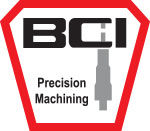When it comes to creating complex parts and components required by the industries served by B.C. Instruments, CNC Milling is one of the most common. This process involves designing individual components in CAD or equivalent software before they are later translated into code for the machining process. By using CAD software, operators can run a simulation on the cutting process to identify any potential problem areas in the project. This results in the ability to double-check each part design to minimize the risk of mistakes when it’s time to create the final product.
CNC Milling is largely an automated process thanks to the technology that goes into the machines, but they do require an operator to be on standby to set up and supervise the process. This can include attaching tools to the spindle that can be hot-swapped during the milling process if this option is supported by the machine in question. By automating most of the process, B.C. Instruments can output work much faster and with greater efficiency.
The milling process is similar to what many might have seen in high school shop class, but the technology involved is much more complex. A rotating tool continuously cuts away at the material in order to slice off chips that end up creating the product shape. Newer CNC Milling machines utilize a technique known as climb milling which reduces operational costs by preventing temperature buildup and other wear and tear on the tools.
CNC Milling machines come in several common forms starting with Bed-Type. This design is built with stability in mind due to the weight of the parts, and the long bed format allows multiple parts to be attached to reduce production time. Knee-Type mills are designed for medium or smaller part sizes due to their decreased stability, plus limits on part sizes. The nature of Knee-Type mills means they are well suited to prototypes, single-run projects or maintenance. Ram-Type mills offer back-and-forth motion on an X or Y axis with an optional swiveling cutting head, and Planer-Type mills are similar in many respects to Bed-Type mills, but feature multi-directional spindles and the ability to handle more milling tools during a single project.
When it comes to materials, CNC Milling machines are quite versatile depending on the project’s individual requirements. Much of this is decided during the concept phase in order to maintain an optimal balance between efficiency and cost-savings. These materials typically include brass, stainless steel, aluminum, nylon, polycarbonate, ABS and more.
B.C. Instruments uses an advanced Mori-Seiki 5-axis Vertical Mill-Turn machining system that mixes high speed with impeccable accuracy for today’s most demanding orders. It also helps guarantee that orders ship on time without any unnecessary holdups. From the very start of the project, we factor in as many upfront costs as possible to work out the right plan to save our customers money, simply by determining the right workflow. Add in our highly trained and skilled personnel, and B.C. Instruments is ready to tackle any project great or small.
Contact Us Now